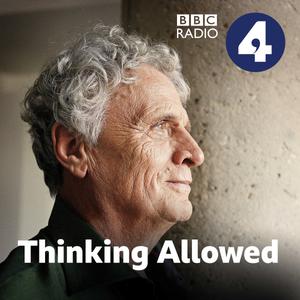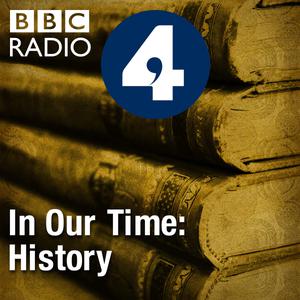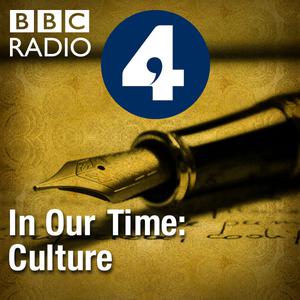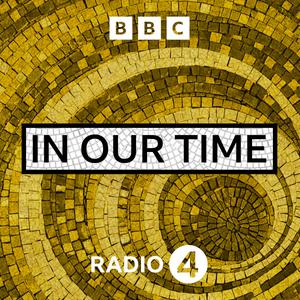
The Forum
BBC
The programme that explains the present by exploring the past.
- 49 minutes 27 secondsThe seductive dance of charisma
Where do charismatic personalities come from? Are they people born with special or even divine gifts? Or have they simply mastered a few effective techniques for cordial social interaction that anyone can learn? As business, entertainment and politics increasingly turn into popularity contests conducted through social media and TV, charisma seems to matter more and more: hence the proliferation of companies offering to teach aspiring leaders how to acquire it. But the influence that magnetic personalities can have on an audience long predates modern screen media: in 1896, a speech brimming with charisma earned one little-known young orator a not just a 20-minute standing ovation but also a US presidential nomination.
Iszi Lawrence explores the role of charisma in politics and business with Julia Sonnevend, Associate Professor of Sociology and Communications at The New School for Social Research in New York and author of Charm: How Magnetic Personalities Shape Global Politics; John Antonakis, Professor of Organizational Behaviour in the Faculty of Business and Economics of the University of Lausanne, and co-author of a political charismometer that predicts US presidential elections among other things; Jeremy C. Young, historian of political culture and social movements, author of The Age of Charisma: Leaders, Followers, and Emotions in American Society; as well as World Service listeners.
(Photo: Smiling businessman in discussion. Credit: Thomas Barwick/Getty Images)
18 January 2025, 7:06 am - 48 minutes 54 secondsThe rise of fans and fandom
When the writer Sir Arthur Conan Doyle killed off his most famous literary creation, Sherlock Holmes, readers were so angry that thousands cancelled their subscriptions to the magazine in which the stories appeared. The editor and Conan Doyle himself were overwhelmed with letters from a furious public - fans who instead of accepting the death of their favourite fictional character then started to write and share their own stories featuring Holmes. They eventually formed clubs and appreciation societies, brought together by a common interest.
This practice is something we recognise today across the globe. In areas as diverse as sport, music, film and TV (to mention just a few), fans are not just passive consumers as the recent activities of Swifties (Taylor Swift fans) demonstrate. They’re actively engaged, creating content of their own and connecting with others to nurture a shared identity. The internet has made that easier than ever before, with fans now using their platform to influence political discourse too.
Iszi Lawrence discusses the history and inexorable rise of fandom, with guests Paul Booth, Professor of Media and Pop Culture at DePaul University in Chicago in the United States; Areum Jeong, Assistant Professor of Korean Studies at Arizona State University in the US and Corin Throsby from the University of Cambridge in the UK, whose research focuses on Romantic literature and early celebrity culture. The programme also includes contributions from Julian Wamble, Assistant Professor of Political Science at George Washington University and the creator of Critical Magic Theory: An Analytical Harry Potter Podcast, and listeners around the world share their fan stories.
Produced by Fiona Clampin for the BBC World Service.
(Photo: Fans wait to pay for items of merchandise as they visit a pop-up store of South Korean K-pop sensation BTS. Credit: ANTHONY WALLACE/AFP via Getty Images)
21 December 2024, 7:06 am - 49 minutes 27 secondsThe enduring allure of jewellery
Jewellery can enthral us in many ways: it can delight, inspire and uplift us or it can transport us to the place where we acquired it. It can also make us avaricious or jealous. But why? What explains our enduring fascination with shiny metal and colourful stones?
Iszi Lawrence is joined by Dr. Emily Stoehrer, Senior Curator of Jewelry at the Boston Museum of Fine Arts and author of several books on American jewellery and fashion; Dr. Petra Ahde-Deal, a Finnish gemmologist and jeweller who currently lectures at the University of Gothenburg in Sweden and at the DIS Study Abroad Program in Copenhagen; Emefa Cole, jewellery maker originally from Ghana who is also the Curator of Diaspora Jewellery at the Victoria and Albert Museum in London; Mansi Rao, Curator of the South Asia Collection in Norwich and World Service listeners.
Some of the questions discussed include: gold has been the top choice both for jewellery makers and for buyers in many cultures all over the world. But there are similar metals which are more scarce - and more expensive - than gold, so it’s not exclusivity that makes it popular. And why do men wear flamboyant jewellery at some Indian weddings?
(Photo: Gold Indian wedding bracelet. Credit: Neha S/Getty Images)
16 November 2024, 7:06 am - 49 minutes 26 secondsWhy sleep sometimes eludes us
Do you find it difficult to get a good night's sleep? If you do, you are not alone. According to the US National Institutes of Health, between 6 and 30 per cent of adults suffer from insomnia or lack of restorative sleep. Since the establishment of sleep medicine a century ago, we have learnt a lot about the causes of sleeplessness. And yet, as the continuing development of new sleep aids demonstrates, its prevalence remains high.
Persistent lack of sleep can have serious consequences for your health but despite this some writers, and other creative people, seem to welcome it. Franz Kafka famously claimed that if he couldn't pursue his stories through the night, they would "break away and disappear".
Iszi Lawrence discusses our changing understanding of insomnia, and its hold over our imagination, with Dr. Manvir Bhatia, the vice-president of Indian Society for Sleep Research; science journalist Kenneth Miller, author of Mapping the Darkness; the Scottish writer – and self-confessed ‘intermittent insomniac’ - A L Kennedy; and World Service listeners.
(Photo: A woman lying awake on a bed at night. Credit: Pony Wang/Getty Images.)
19 October 2024, 6:06 am - 49 minutes 31 secondsThe high-speed train race
The first public run of the Japanese ‘bullet train’, the Shinkansen, on the 1st of October 1964, captured public imagination worldwide. And it wasn’t just the train’s sleek look or its high speed that made the headlines. Behind the train’s futuristic exterior lay a whole host of engineering innovations: new pantographs, automatic signalling, revolutionary drive units. Since then, very fast train travel has become available in over a dozen other countries. Places such as China and Spain have overtaken Japan when it comes to top train speed or the extent of the high-speed network. But the recent rise in remote working has reduced the demand for business rail travel and commuting. So what does the future hold for high-speed rail?
Iszi Lawrence talks about the origins of high-speed rail and its current state to historian of modern Japan, Prof. Jessamyn Abel from Penn State university, civil engineering professor Amparo Moyano from the University of Castilla-La Mancha, Consultant Editor of the Railway Gazette Murray Hughes, poet Jan Ducheyne and World Service listeners.
(Photo: A Shinkansen train arrives at a Tokyo station. Credit: Carl Court/Getty Images)
21 September 2024, 6:06 am - 48 minutes 44 secondsThe diary: A life page by page
During the Covid-19 pandemic, many people found that keeping a diary was one way of reducing stress during uncertain times. They also felt that it was important to chart their day to day experience of a historic moment in world history. Such diaries will be valuable sources in years to come for historians, providing future scholars with a glimpse into the lives of ordinary people.
These diaries form part of a long tradition of people chronicling their own stories, whether intended for publication or purely to put thoughts down on paper. One of the earliest texts we could describe as a diary was written by the Roman emperor Marcus Aurelius, whose musings were influenced by Stoic philosophy. Later diaries, such as those by or the African American naval yard worker Michael Shiner or the teenage Anne Frank, have been important in helping us understand society and events from ‘the bottom up’ during a given period.
Iszi Lawrence explores what motivates people to keep diaries. She’s joined by a panel of experts including Dr Polly North, Founding Director of the Great Diary Project at Bishopsgate Institute in the UK; Julie Rak, the Henry Marshall Tory Chair in the Department of English and Film Studies at the University of Alberta who's an expert on what’s known as life writing; and Sergio da Silva Barcellos who’s published widely on diary keeping in Brazil, including a chapter in The Diary: The Epic of Everyday Life.
Produced by Fiona Clampin for BBC World Service.
(Photo: A diary. With kind permission of Forum listener Dorothy.)
24 August 2024, 6:30 am - 48 minutes 39 secondsThe only way is up: A history of mountaineering
Humans have always co-existed with mountains, as ancient remains found in glaciers prove. But our interest in them may have been more spiritual or religiously motivated, rather than as a place to go to improve our health and wellbeing. In some cultures today, mountains are still considered to be the home of deities. So when did mountaineering become a popular pastime and how did the obsession with bagging summits start? Iszi Lawrence investigates our evolving relationship with the planet’s highest peaks.
Iszi is joined by Dawn Hollis, author of Mountains before Mountaineering: The Call of the Peaks before the Modern Age; Peter Hansen, Professor of History and Director of International and Global Studies at Worcester Polytechnic Institute in the US, and author of various books on mountaineering including The Summits of Modern Man: Mountaineering after the Enlightenment; and anthropologist and mountaineer Young Hoon Oh. The programme will also hear from blogger Andrew Szalay, otherwise known as the Suburban Mountaineer. And a range of Forum listeners from around the world contribute their personal experiences of mountains.
Produced by Fiona Clampin for BBC World Service
(Photo: Mountaineer with ice pick ascending Hintertux Glacier in Austria. Credit: David Trood/Getty Images)
20 July 2024, 6:06 am - 49 minutes 25 secondsMusic on the move
Many of us remember the first portable music device we owned: a transistor radio, a boombox, a Walkman or perhaps an iPod. We might even recall the songs we played on it. But we might be less aware of how profoundly audio technology developments from the 1950s to 2000s changed the ways in which we consume music and other audio outside of the home or concert venue. Transistor radios allowed outdoor sounds and noises to mix and compete with those coming over the airwaves, creating new auditory experiences; the cassette player gave the listener a cheap way of making and re-making their own playlists; and the advent of digital music players encouraged us to ‘own’ music recordings without possessing a physical copy of the audio.
Iszi Lawrence discusses the history of portable music with Dr. Annie Jamieson, Curator of Sound Technologies at Bradford’s National Science and Media Museum; American drummer and writer Damon Krukowski; Dr. Jahnavi Phalkey, science historian and Founding Director of Science Gallery Bengaluru, India; Karin Bijsterveld, Professor of Science, Technology and Modern Culture at Maastricht University; and World Service listeners.
(Photo: Andrii Iemelyanenko/ Getty Images)
15 June 2024, 6:06 am - 49 minutes 28 secondsThe fight for women’s education
Among all the talk about ‘knowledge economy’ it is easy to forget that universal schooling is a relatively new phenomenon. Mandated first in a few European countries in the 18th century, it did not reach many others until the 20th. And the idea that women have an equal right to be educated frequently encountered stiff opposition, often from the privileged who feared that knowledgeable females would upset the social status quo.
Just about everywhere, the right to women’s education was hard won: for instance Bal Gangadhar Tilak, one of the influential leaders of Indian independence movement, campaigned vociferously for decades against sending girls to school, complaining that it would lead to increased competition for jobs and to women neglecting their ‘domestic duties’. Mary Carpenter, the acclaimed Victorian education reformer, maintained that neatness and needlework, rather than a full academic curriculum, were ‘essential to a woman’.
Fast forward to 2024 and even though the gap between male and female educational attainment has narrowed world-wide, there are still many places where women lag behind, even in something as basic as literacy. According to UNESCO, women today account for almost two-thirds of all adults unable to read.
So how did we get here? And how can we close this gap? Iszi Lawrence follows the story of women’s education with Jane Martin, Professor of Social History of Education at Birmingham University; Parimala V. Rao, Professor of the History of Education at Jawaharlal Nehru University in New Delhi; Dr. Karen Teoh, Associate of the Fairbank Center for Chinese Studies at Harvard and World Service listeners.
(Photo: Teenage girls and boys learning in classroom. Credit: Maskot/Getty Images)
18 May 2024, 6:06 am - 49 minutes 26 secondsFeeding the world and the Green Revolution
In February 2024, the renowned Indian geneticist Dr. MS Swaminathan was posthumously awarded the country’s highest civilian honour, the Bharat Ratna. This was in recognition of the dramatic increase in the yields of food staples, such as rice and wheat, that Indian agriculture experienced under his stewardship of the ‘green revolution’ in the 20th century. That revolution is credited with saving many people from hunger and malnutrition across Asia and Latin America. And yet, half-a-century on farmers’ incomes in Africa, Asia and Europe are falling and in many countries farmers are on the streets protesting. At the same time, the environmental impacts of intensive food production are becoming increasingly clear. So do we need a new ‘green revolution’? And is the use of the latest agricultural technology, from robots to AI the answer?
Rajan Datar discusses the past and present of food growing with Professor of Economics Douglas Gollin, crop scientist Professor Nigel Halford, historian of science Dr. Madhumita Saha, robotics project manager Andreas Hofland and listeners from around the world.
(Photo: Green ear of wheat. Credit: binabina/iStock/Getty Images Plus)
20 April 2024, 6:06 am - 48 minutes 52 secondsEtiquette
‘Always pass the salt and pepper together, even if your fellow diner has asked just for one of them’. That’s the standard advice given by countless dining etiquette manuals, one of the many rules regarding proper manners that have been handed down from generation to generation. But what if some of the rules have become outdated, silly or just wrong? And why do we have etiquette in the first place? Where do the rules of polite conduct come from and are they the same the world over?
Iszi Lawrence follows the story of etiquette across time and over several continents with the help of Annick Paternoster, Lecturer at the University of Lugano in Switzerland who has a special interest in the history of politeness; Professor Daniel Kadar from Dalian University of Foreign Languages in China, the HUN-REN Hungarian Research Centre for Linguistics, and the University of Maribor in Slovenia; Courtney Traub, author and editor of the travel website Paris Unlocked; Japanese writer and cultural commentator Manami Okazaki; former Chief of Protocol at the Foreign Ministry of Grenada Alice Thomas-Roberts; and Forum listeners from around the world.
(Photo: Business people shake hands. Credit: iStock/Getty Images Plus)
16 March 2024, 7:06 am - More Episodes? Get the App
Your feedback is valuable to us. Should you encounter any bugs, glitches, lack of functionality or other problems, please email us on [email protected] or join Moon.FM Telegram Group where you can talk directly to the dev team who are happy to answer any queries.
 Thinking Allowed
Thinking Allowed
 In Our Time: History
In Our Time: History
 In Our Time: Culture
In Our Time: Culture
 The History Hour
The History Hour
 In Our Time
In Our Time
 The Inquiry
The Inquiry